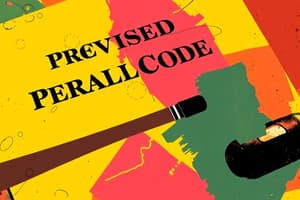Podcast
Questions and Answers
What is an ex post facto law?
What is an ex post facto law?
- A law that regulates civil rights without punishment.
- A law that increases penalties for a crime after it was committed. (correct)
- A law that punishes actions that were innocent when done. (correct)
- A law that does not allow for due process.
No person shall be held to answer for a criminal offense without due process of law.
No person shall be held to answer for a criminal offense without due process of law.
True (A)
What does a bill of attainder do?
What does a bill of attainder do?
Inflicts punishment without trial.
An ex post facto law changes the __________ of a crime.
An ex post facto law changes the __________ of a crime.
Which of the following is NOT a characteristic of an ex post facto law?
Which of the following is NOT a characteristic of an ex post facto law?
Flashcards are hidden until you start studying
Study Notes
Limitations on Enacting Penal Laws
- No ex post facto laws or bills of attainder are permitted, ensuring that laws cannot criminalize actions retroactively.
- Accused individuals are entitled to due process of law before being held accountable for a criminal offense.
Ex Post Facto Laws
- Defined as laws that:
- Criminalize actions that were legal when committed.
- Increase the severity of a crime compared to when it was initially carried out.
- Alter punishments to impose harsher sanctions than those applicable at the time of the offense.
- Change evidentiary rules to allow for convictions based on different or lesser testimony than originally required.
- Affect civil rights without proper legal basis, essentially imposing penalties for actions that were lawful.
- Remove legal protections from previously secured acquittals or convictions.
Bill of Attainder
- A bill of attainder is a legislative measure that results in punishment without a trial, substituting legislative action for judicial processes.
Structure of the Revised Penal Code
- Book One outlines the definitions and classifications concerning criminal law:
- Title I: Discusses felonies and circumstances affecting criminal liability, covering justification and exemptions.
- Title II: Identifies individuals who can be held criminally liable for felonies.
- Title III: Details penalties, including general classifications, durations, and application.
- Title IV: Focuses on the extinction of criminal liability, both total and partial.
Studying That Suits You
Use AI to generate personalized quizzes and flashcards to suit your learning preferences.




